Abstract
Cardiovascular responses to intravenous administration of norepinephrine and the properties of alpha receptors on platelets were compared in normal human subjects and subjects with multiple system atrophy (MSA) and sympathetic degeneration. All the subjects with MSA had low plasma norepinephrine concentrations (in the supine position) (0.42 +/- 0.09 nM, normal 3.47 +/- 0.58 nM), which did not increase on tilt. The pressor sensitivity of subjects with MSA to norepinephrine infusion was increased 10- to 20-fold, demonstrating denervation supersensitivity to adrenergic agonists. Analysis of alpha receptors was by binding of [3H]dihydroergocryptine to platelets. Results are shown as mean +/- standard error of the mean. In the MSA subjects, the number of alpha receptors (1,712 +/- 699 fmol/10(8) platelets) was about sevenfold greater than in normal subjects (224 +/- 21 fmol/10(8) platelets), and the affinity, as measured by the equilibrium dissociation constant (Kd), was similar in both groups (MSA subjects, 9.6 +/- 4.3 nM; normal subjects, 4 +/- 0.5 nM). These observations suggest that an increase in alphaadrenergic receptor numbers may account for the denervation supersensitivity to infused norepinephrine in patients with sympathetic degeneration. All the subjects with MSA had low levels of the endogenous adrenergic transmitter norepinephrine: the simultaneous increase in alpha adrenergic receptors supports the theory of agonist regulation of receptor numbers.
Full text
PDF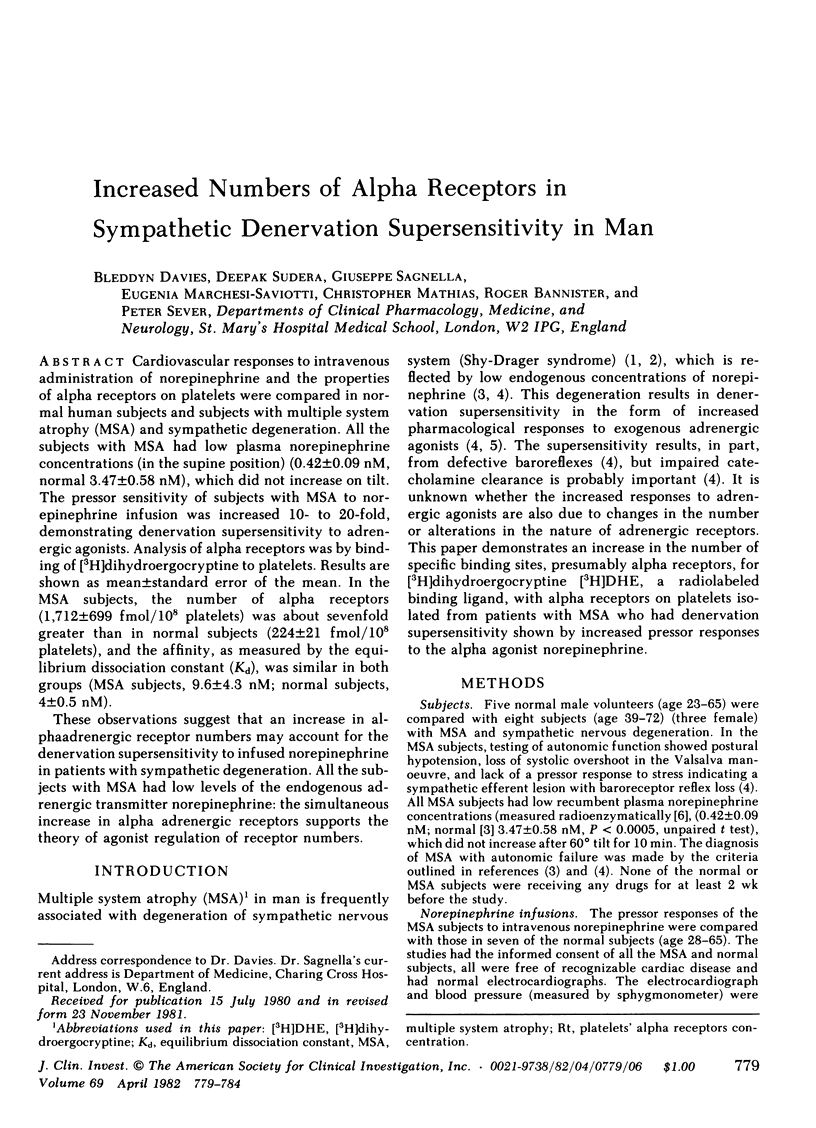
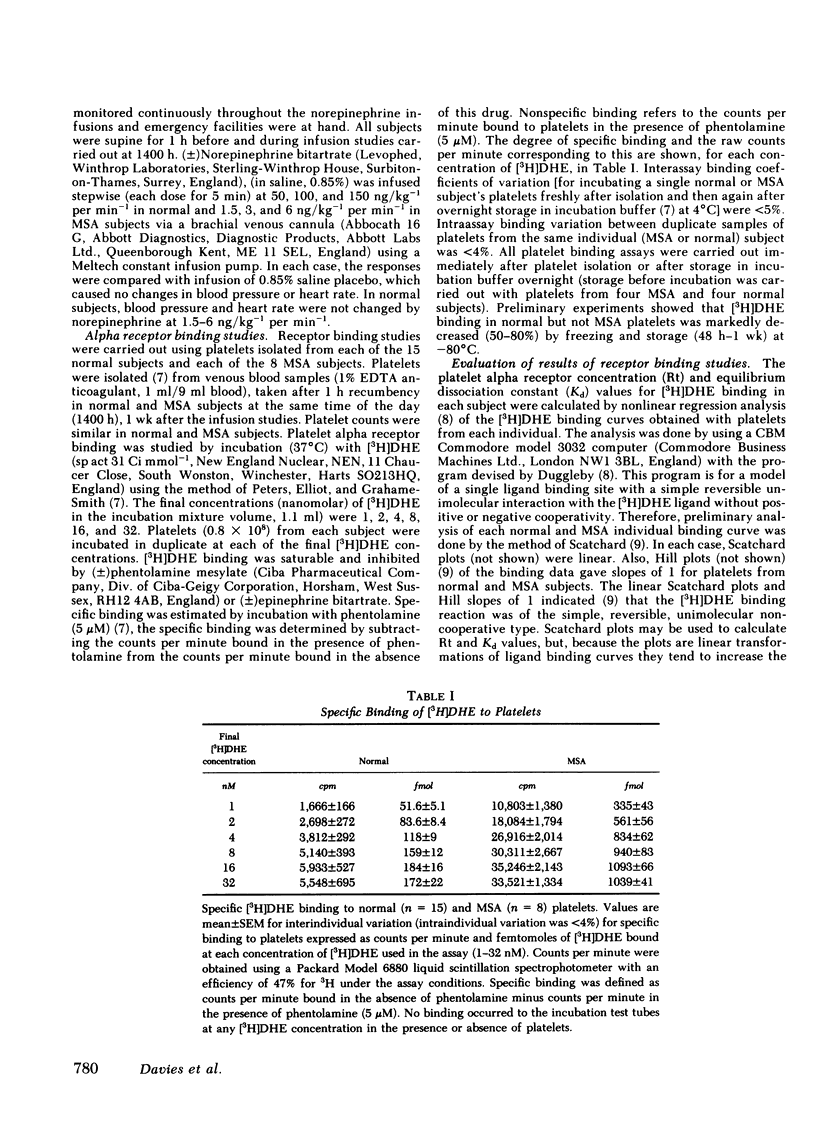
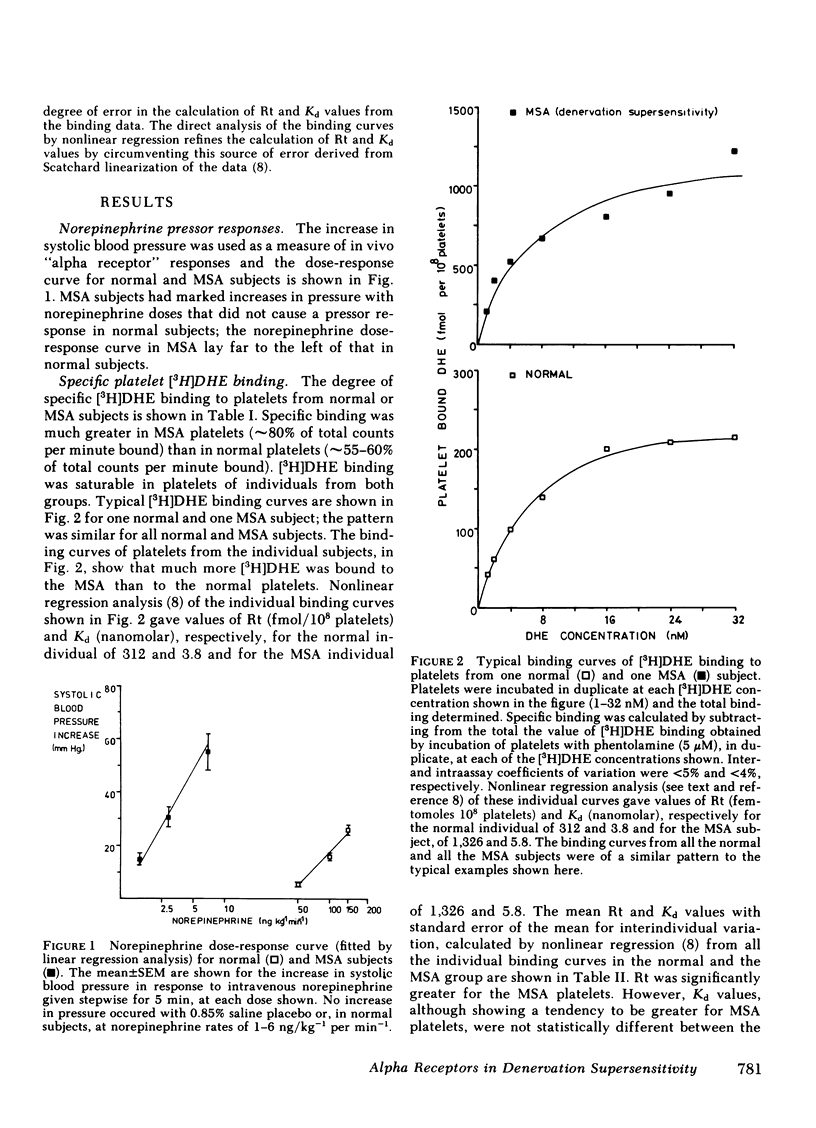
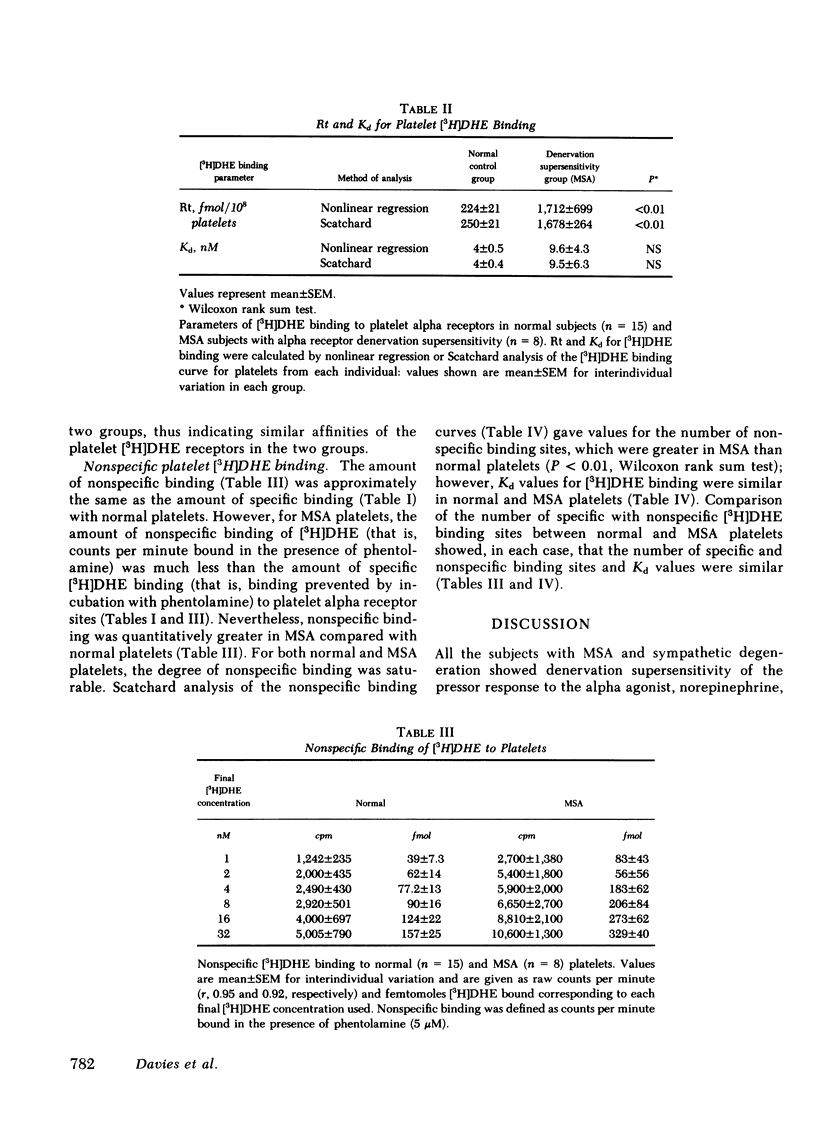
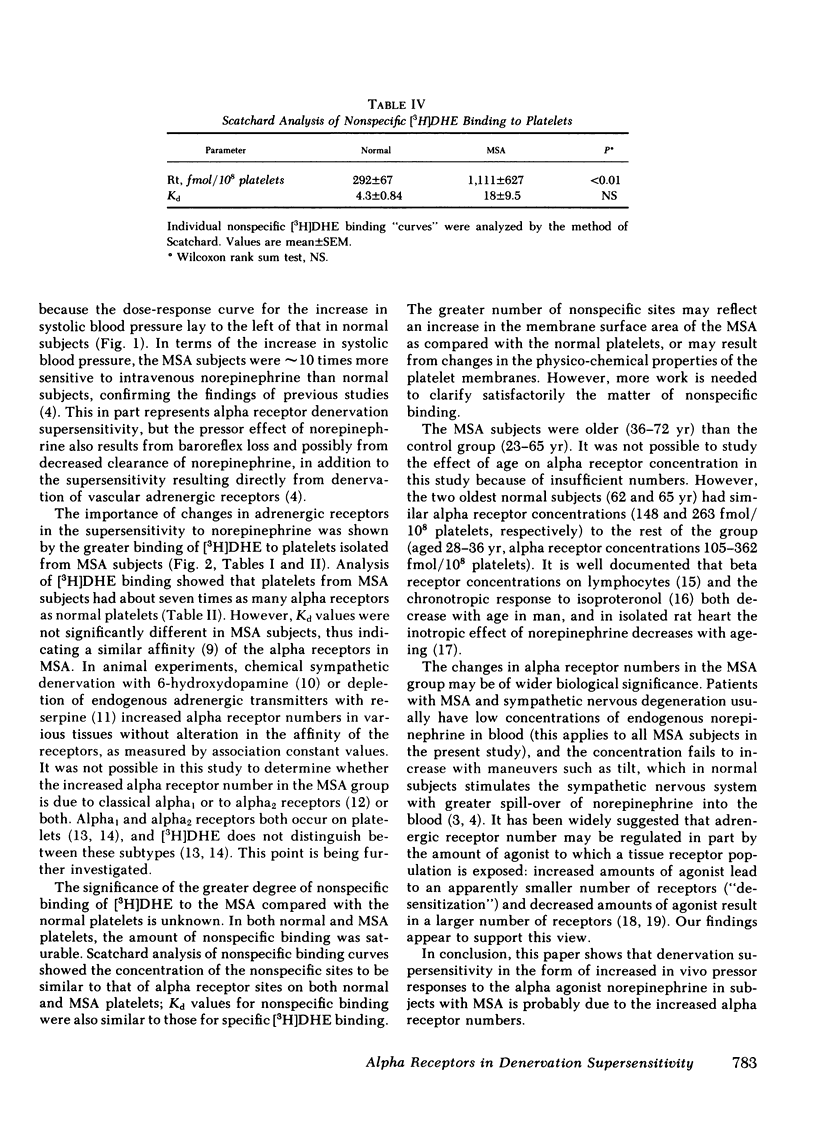
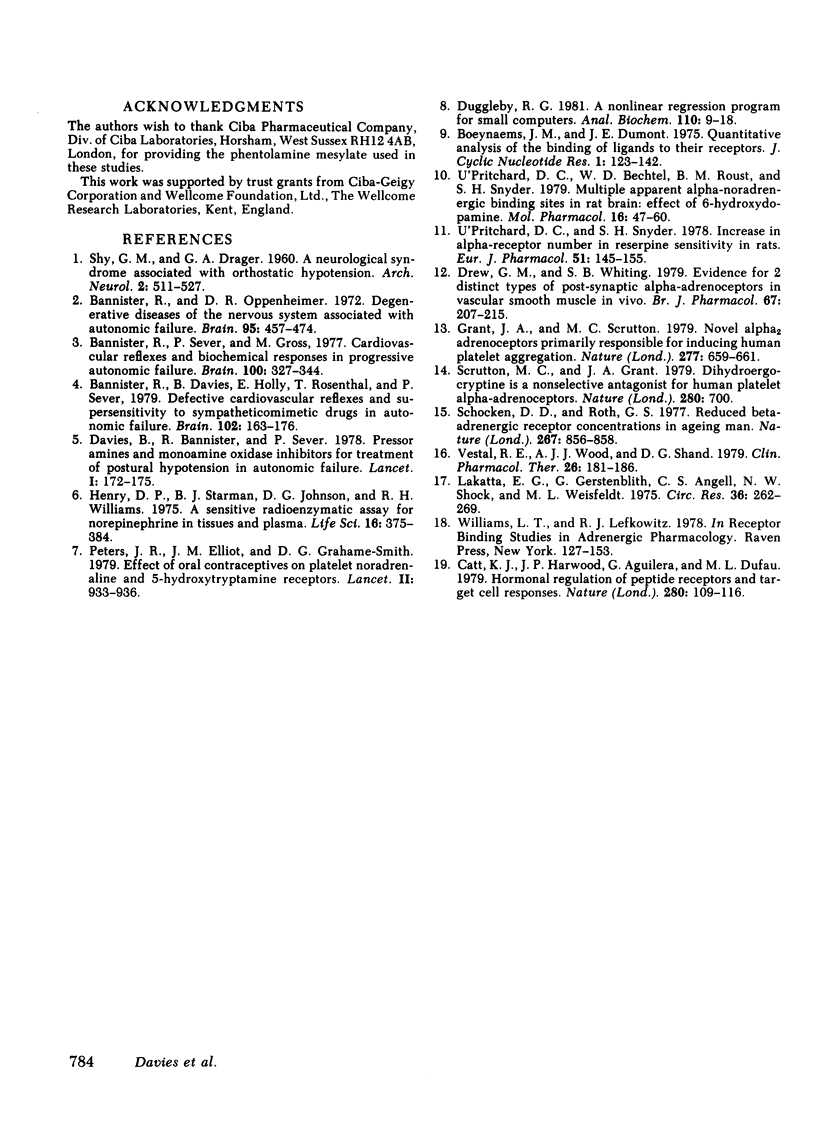
Selected References
These references are in PubMed. This may not be the complete list of references from this article.
- Bannister R., Davies B., Holly E., Rosenthal T., Sever P. Defective cardiovascular reflexes and supersensitivity to sympathomimetic drugs in autonomic failure. Brain. 1979 Mar;102(1):163–176. doi: 10.1093/brain/102.1.163. [DOI] [PubMed] [Google Scholar]
- Bannister R., Oppenheimer D. R. Degenerative diseases of the nervous system associated with autonomic failure. Brain. 1972;95(3):457–474. doi: 10.1093/brain/95.3.457. [DOI] [PubMed] [Google Scholar]
- Bannister R., Sever P., Gross M. Cardiovascular reflexes and biochemical responses in progressive autonomic failure. Brain. 1977 Jun;100(2):327–344. doi: 10.1093/brain/100.2.327. [DOI] [PubMed] [Google Scholar]
- Catt K. J., Harwood J. P., Aguilera G., Dufau M. L. Hormonal regulation of peptide receptors and target cell responses. Nature. 1979 Jul 12;280(5718):109–116. doi: 10.1038/280109a0. [DOI] [PubMed] [Google Scholar]
- Davies B., Bannister R., Sever P. Pressor amines and monoamine-oxidase inhibitors for treatment of postural hypotension in autonomic failure. Limitations and hazards. Lancet. 1978 Jan 28;1(8057):172–175. doi: 10.1016/s0140-6736(78)90610-4. [DOI] [PubMed] [Google Scholar]
- Drew G. M., Whiting S. B. Evidence for two distinct types of postsynaptic alpha-adrenoceptor in vascular smooth muscle in vivo. Br J Pharmacol. 1979 Oct;67(2):207–215. doi: 10.1111/j.1476-5381.1979.tb08668.x. [DOI] [PMC free article] [PubMed] [Google Scholar]
- Duggleby R. G. A nonlinear regression program for small computers. Anal Biochem. 1981 Jan 1;110(1):9–18. doi: 10.1016/0003-2697(81)90104-4. [DOI] [PubMed] [Google Scholar]
- Grant J. A., Scrutton M. C. Novel alpha2-adrenoreceptors primarily responsible for inducing human platelet aggregation. Nature. 1979 Feb 22;277(5698):659–661. doi: 10.1038/277659a0. [DOI] [PubMed] [Google Scholar]
- Henry D. P., Starman B. J., Johnson D. G., Williams R. H. A sensitive radioenzymatic assay for norepinephrine in tissues and plasma. Life Sci. 1975 Feb 1;16(3):375–384. doi: 10.1016/0024-3205(75)90258-1. [DOI] [PubMed] [Google Scholar]
- Lakatta E. G., Gerstenblith G., Angell C. S., Shock N. W., Weisfeldt M. L. Diminished inotropic response of aged myocardium to catecholamines. Circ Res. 1975 Feb;36(2):262–269. doi: 10.1161/01.res.36.2.262. [DOI] [PubMed] [Google Scholar]
- Peters J. R., Elliott J. M., Grahame-Smith D. G. Effect of oral contraceptives on platelet noradrenaline and5-hydroxytryptamine receptors and aggregation. Lancet. 1979 Nov 3;2(8149):933–936. doi: 10.1016/s0140-6736(79)92626-6. [DOI] [PubMed] [Google Scholar]
- SHY G. M., DRAGER G. A. A neurological syndrome associated with orthostatic hypotension: a clinical-pathologic study. Arch Neurol. 1960 May;2:511–527. doi: 10.1001/archneur.1960.03840110025004. [DOI] [PubMed] [Google Scholar]
- Schocken D. D., Roth G. S. Reduced beta-adrenergic receptor concentrations in ageing man. Nature. 1977 Jun 30;267(5614):856–858. doi: 10.1038/267856a0. [DOI] [PubMed] [Google Scholar]
- Scrutton M. C., Grant J. A. Dihydroergocryptine is a non-selective antagonist for human platelet alpha-adrenoreceptors. Nature. 1979 Aug 23;280(5724):700–700. doi: 10.1038/280700a0. [DOI] [PubMed] [Google Scholar]
- U'Prichard D. C., Bechtel W. D., Rouot B. M., Snyder S. H. Multiple apparent alpha-noradrenergic receptor binding sites in rat brain: effect of 6-hydroxydopamine. Mol Pharmacol. 1979 Jul;16(1):47–60. [PubMed] [Google Scholar]
- U'Prichard D. C., Snyder S. H. 3H-Catecholamine binding to alpha-receptors in rat brain: enhancement by reserpine. Eur J Pharmacol. 1978 Sep 15;51(2):145–155. doi: 10.1016/0014-2999(78)90339-4. [DOI] [PubMed] [Google Scholar]
- Vestal R. E., Wood A. J., Shand D. G. Reduced beta-adrenoceptor sensitivity in the elderly. Clin Pharmacol Ther. 1979 Aug;26(2):181–186. doi: 10.1002/cpt1979262181. [DOI] [PubMed] [Google Scholar]



